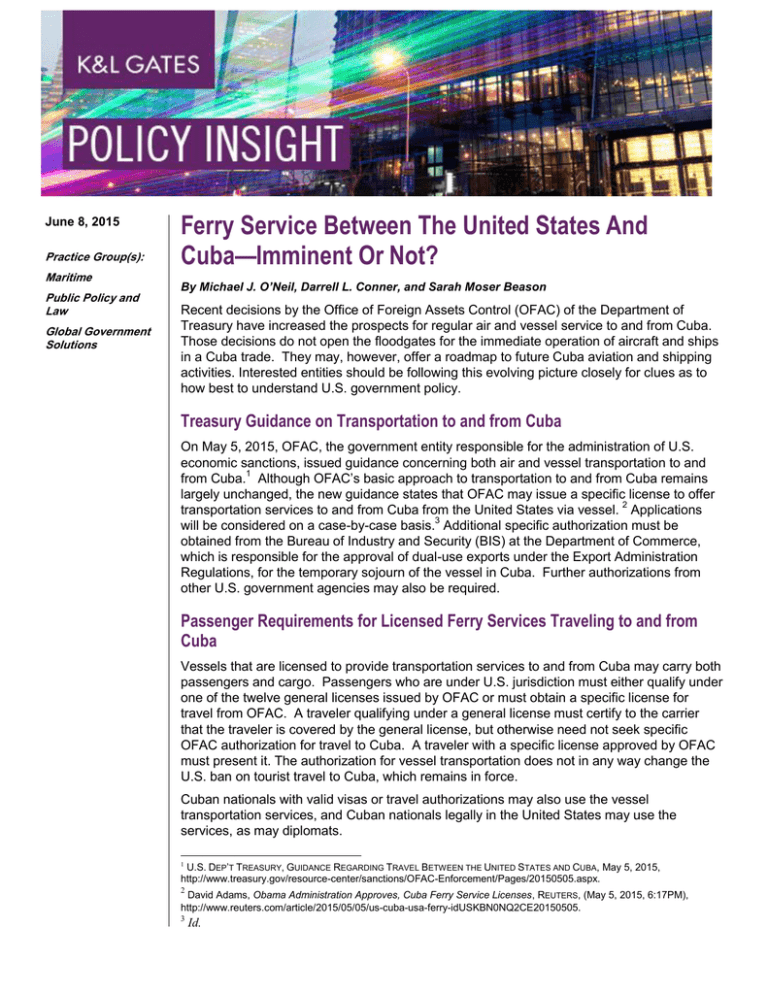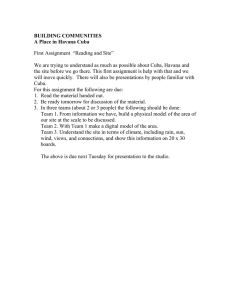
June 8, 2015
Practice Group(s):
Maritime
Public Policy and
Law
Global Government
Solutions
Ferry Service Between The United States And
Cuba—Imminent Or Not?
By Michael J. O’Neil, Darrell L. Conner, and Sarah Moser Beason
Recent decisions by the Office of Foreign Assets Control (OFAC) of the Department of
Treasury have increased the prospects for regular air and vessel service to and from Cuba.
Those decisions do not open the floodgates for the immediate operation of aircraft and ships
in a Cuba trade. They may, however, offer a roadmap to future Cuba aviation and shipping
activities. Interested entities should be following this evolving picture closely for clues as to
how best to understand U.S. government policy.
Treasury Guidance on Transportation to and from Cuba
On May 5, 2015, OFAC, the government entity responsible for the administration of U.S.
economic sanctions, issued guidance concerning both air and vessel transportation to and
from Cuba.1 Although OFAC’s basic approach to transportation to and from Cuba remains
largely unchanged, the new guidance states that OFAC may issue a specific license to offer
transportation services to and from Cuba from the United States via vessel. 2 Applications
will be considered on a case-by-case basis.3 Additional specific authorization must be
obtained from the Bureau of Industry and Security (BIS) at the Department of Commerce,
which is responsible for the approval of dual-use exports under the Export Administration
Regulations, for the temporary sojourn of the vessel in Cuba. Further authorizations from
other U.S. government agencies may also be required.
Passenger Requirements for Licensed Ferry Services Traveling to and from
Cuba
Vessels that are licensed to provide transportation services to and from Cuba may carry both
passengers and cargo. Passengers who are under U.S. jurisdiction must either qualify under
one of the twelve general licenses issued by OFAC or must obtain a specific license for
travel from OFAC. A traveler qualifying under a general license must certify to the carrier
that the traveler is covered by the general license, but otherwise need not seek specific
OFAC authorization for travel to Cuba. A traveler with a specific license approved by OFAC
must present it. The authorization for vessel transportation does not in any way change the
U.S. ban on tourist travel to Cuba, which remains in force.
Cuban nationals with valid visas or travel authorizations may also use the vessel
transportation services, and Cuban nationals legally in the United States may use the
services, as may diplomats.
U.S. DEP’T TREASURY, GUIDANCE REGARDING TRAVEL BETWEEN THE UNITED STATES AND CUBA, May 5, 2015,
http://www.treasury.gov/resource-center/sanctions/OFAC-Enforcement/Pages/20150505.aspx.
1
2
David Adams, Obama Administration Approves, Cuba Ferry Service Licenses, REUTERS, (May 5, 2015, 6:17PM),
http://www.reuters.com/article/2015/05/05/us-cuba-usa-ferry-idUSKBN0NQ2CE20150505.
3
Id.
Ferry Service Between The United States And Cuba—Imminent Or Not?
Vessels that are licensed to provide transportation to Cuba may carry cargo and luggage
accompanying passengers and any unaccompanied baggage or other goods authorized for
export to Cuba by BIS license or other authorization. Travelers may also import goods from
Cuba authorized by a general or specific license. There are limits to the value and type of
Cuban merchandize that travelers returning to the United States may bring into the United
States.
Additional Requirements beyond Licensing
Press reports say that at least six companies have received licenses since May 5, 2015 to
offer ferry services to Cuba and that several are poised to do so.4 At least one licensed
company has expressed its hope to commence service as early as September 2015.5
Although many people may believe, or hope, that the provision of ferry services to and from
Cuba is imminent, a number of other requirements must be satisfied before these
companies, or any other licensed company, can commence ferry services to and from Cuba.
Before these companies can begin providing ferry services to Cuba, the Coast Guard must
approve the Cuban ports to which the ferries will travel.
Importantly, in addition, the Cuban government must itself agree to permit each proposed
ferry service and provide necessary authorizations, e.g., for dock access, etc., at its end.
José Cabañas, the chief of the Cuban Interest Section in Washington, D.C., has stated that
each company’s proposal will be reviewed by Cuban authorities, which “will take time.”6 It
remains unclear what requirements the Cuban government will impose. Mr. Cabañas also
noted that the companies that have received licenses from the United States have not yet
contacted the Cuban government concerning their proposals, at least as of May 11.7
One complication is that Cuba currently bans persons born in Cuba from traveling to or from
Cuba by sea. However, Cuba may be considering a change to this regulation.8
Application Instructions
A company subject to U.S. jurisdiction wishing to apply for a license to provide ferry service
to and from Cuba should submit its application in the form of a letter to the Office of Foreign
Assets Control, U.S. Department of the Treasury, Treasury Annex, 1500 Pennsylvania
Avenue, N.W., Washington, D.C. 20220.
A company seeking to provide cargo service to Cuba must do so under the authority of a
license from OFAC. In addition, cargo carried by a vessel covered by such a license must
be licensed by BIS. Cuban authorities must also authorize such arrangements. Also,
4
See, e.g., Two More Companies Receive U.S. Licenses for Ferry Service to Cuba, SUN SENTINEL (May 6, 2015,
4:39PM), http://touch.sun-sentinel.com/#section/-1/article/p2p-83475237/; Mimi Whitefield, Ferry Service to Cuba May
Return to the Florida Straits, MIAMI HERALD (May 5, 2015), http://www.miamiherald.com/news/local/community/miamidade/article20296911.html.
5
David Adams, Obama Administration Approves Ferry Service to Cuba, REUTERS (May 5, 2015, 7:57PM),
http://www.reuters.com/article/2015/05/05/cuba-usa-ferry-idUSL1N0XW3EF20150505.
6
Cuban Official: Ferries “Will Take Time,” CUBA STANDARD (May 11, 2015, 12:18PM),
https://www.cubastandard.com/?p=13187.
7
Id.
8
Mimi Whitefield, Ferry Service to Cuba May Return to the Florida Straits, MIAMI HERALD (May 5, 2015),
http://www.miamiherald.com/news/local/community/miami-dade/article20296911.html.
2
Ferry Service Between The United States And Cuba—Imminent Or Not?
maintaining a permanent office in Cuba to handle cargo shipments requires a license from
OFAC.
Officials of companies that wish to travel to Cuba to arrange ferry or cargo service to and
from Cuba may do so pursuant to a license issued by OFAC.
The Time to Engage is Now
As business opportunities in Cuba continue to develop, any company considering Cuba as a
part of their future business strategy should not only monitor the process but also engage.
Now is the time to actively plan and strategically position one’s company for the future in
Cuba.
Authors:
Michael J. O’Neil
mike.oneil@klgates.com
+1.202.661.6226
Darrell L. Conner
darrell.conner@klgates.com
+1.202.661.6220
Sarah M. Beason
sarah.beason@klgates.com
+1.202.778.9019
Anchorage Austin Beijing Berlin Boston Brisbane Brussels Charleston Charlotte Chicago Dallas Doha Dubai Fort Worth Frankfurt
Harrisburg Hong Kong Houston London Los Angeles Melbourne Miami Milan Moscow Newark New York Orange County Palo Alto Paris
Perth Pittsburgh Portland Raleigh Research Triangle Park San Diego San Francisco São Paulo Seattle Seoul Shanghai Singapore Spokane
Sydney Taipei Tokyo Warsaw Washington, D.C. Wilmington
K&L Gates comprises more than 2,000 lawyers globally who practice in fully integrated offices located on five
continents. The firm represents leading multinational corporations, growth and middle-market companies, capital
markets participants and entrepreneurs in every major industry group as well as public sector entities, educational
institutions, philanthropic organizations and individuals. For more information about K&L Gates or its locations,
practices and registrations, visit www.klgates.com.
This publication is for informational purposes and does not contain or convey legal advice. The information herein should not be used or relied upon in
regard to any particular facts or circumstances without first consulting a lawyer.
©2015 K&L Gates LLP. All Rights Reserved.
3





